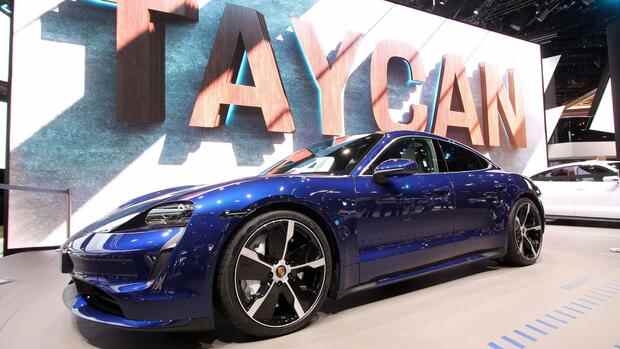Since the beginning of the year, more electric Porsches have been delivered than 911s.
(Photo: imago images / Ralph Peters)
Dusseldorf It is only a difference of 700 vehicles, but it is evidence of a turning point. In the first nine months of the year, Porsche sold more fully electric Taycans than 911s, the Porsche sports car icon par excellence. The electric sports car had been delivered 28,640 times by the end of September, while the combustion 911 was “only” 27,972 times.
Although it has only been on the market for two years, the Taycan has left the historic Porsche model behind in terms of registrations. This development is also astonishing because the Taycan does not benefit from purchase premiums. The electric sports car is simply too expensive for that. The quantity sold is therefore undistorted.
The figures show that electromobility is becoming increasingly popular even in the lead-free sports car sector. This development fits in with the general market dynamics. According to the Federal Motor Transport Authority (KBA), around 24 percent fewer vehicles with gasoline and even more than 30 percent fewer vehicles with diesel engines were registered in Germany from January to September compared to the previous year. In the case of electric cars, on the other hand, there was an increase of over 140 percent in the same period.
“Demand for our sports cars was also at a very high level in the third quarter and we are pleased that we were able to hand over so many vehicles to customers in the first nine months of the year,” says Detlev von Platen, Sales Director at Porsche. The order books are still well filled. Von Platen expects that the sales figures will also increase significantly in the last quarter of the year – despite the lack of chips.
Top jobs of the day
Find the best jobs now and
be notified by email.
Missing semiconductors: production stagnates, employees on short-time work
Missing semiconductors are currently causing problems for automakers. Again and again they have to stop their production lines and send their employees on short-time work because chips are missing. As a result, almost eight million vehicles could not be produced this year alone. Industry observers assume that around eleven million fewer cars could be built worldwide by the end of the year than originally expected.
However, like many premium manufacturers, Porsche has come through the crisis well so far. The reason: car companies are currently prioritizing the production of expensive, high-margin vehicles. In this way, they want to compensate for the financial losses due to a lack of semiconductors. At Volkswagen, this means that instead of Golfs or Passats, Porsche models are increasingly being manufactured with the limited chips available.
The result: From the first to the third quarter, Porsche delivered almost 218,000 vehicles, 13 percent more than in the previous year, and a new record. The Porsche Cayenne makes up the majority. The SUV had been delivered over 62,000 times by the end of September, closely followed by the Macan with 61,944 units.
The US market has developed particularly strongly. Compared to the same period in the previous year, Porsche was able to deliver around 30 percent more vehicles with over 51,600 units. In Europe, the number of deliveries rose the weakest with two percent to around 56,300. More than 19,000 of these were delivered in Germany. In this country, the sales figures rose by nine percent. In China, sales increased by eleven percent from almost 63,000 to almost 70,000.
According to Van Platen, the global corona situation remains volatile and the supply of semiconductors is challenging. “That is why we are monitoring current developments very closely so that we can continue to react flexibly,” says the sales manager.
More: E-fuels from Chile: How Porsche wants to save the 911.

